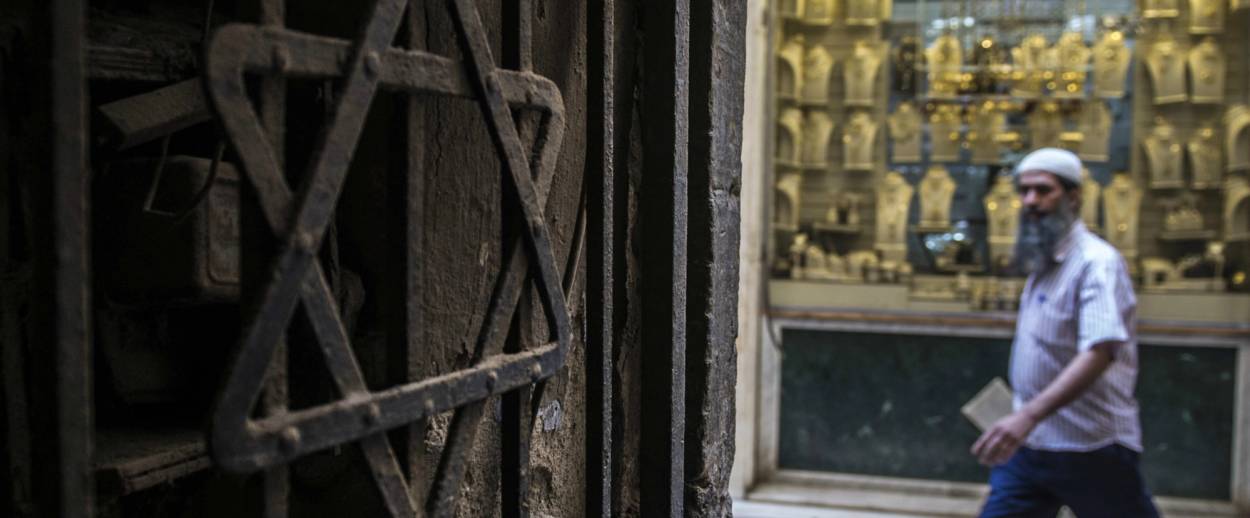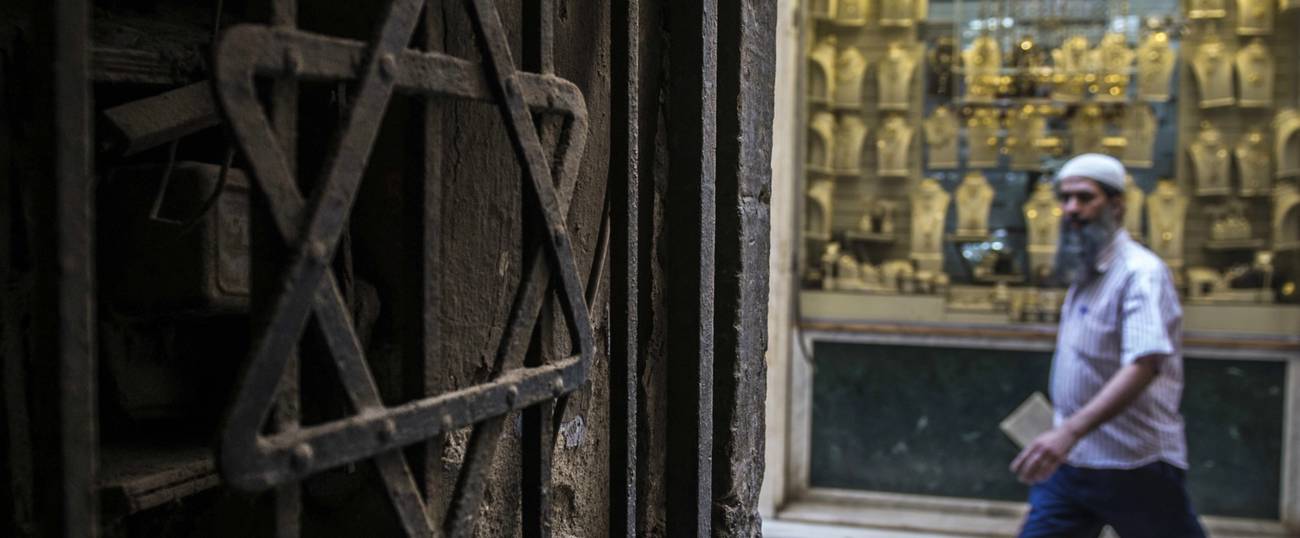Egyptian TV Show Depicting Cairo’s Jewish Quarter in 1948 Is a Hit in the West Bank
The Jewish Quarter grabbed huge market share during Ramadan. But can it foment understanding and peace in the Middle East?




A breakthrough seems to have occurred in the eternally stonewalled Israeli/Arab conflict, and yet not a shot was fired, a curfew lifted, or an olive branch extended—and neither Barack nor Bibi made the first move toward a kiss. Indeed, this unofficial rapprochement was done without ambassadors and starchy protocols. In fact, this inkling of peace owes much more to the programmatic instincts of TV diplomacy.
A new dramatic series called, The Jewish Quarter, which first aired in Egypt, then throughout the Middle East and North Africa, and now on public television in the West Bank, is attracting the kind of eyeballs that even the suits over at Showtime covet for Homeland. During the holy month of Ramadan, when television series are ardently consumed, The Jewish Quarter was running on several channels repeatedly throughout the day in Egypt. With Ramadan now over, it has a 40 percent share of the prime time market in the West Bank.
And The Jewish Quarter is a love story with legs.
The soap opera follows the Haroun family in 1948, when thousands Jews happily called Egypt their home, even though across the Sinai Peninsula a Jewish homeland is beginning its nascent days of statehood. In the show’s narrative, the Jewish son wishes to leave Egypt for Israel, and his sister regards him as a traitor to their country. Of course, she has her own motives for staying put: She’s in love with a Muslim military officer who just happens to also be a hero to the Egyptian Jewish community. Think Romeo and Juliet in a volatile region of the world that would make the feud between the Montagues and Capulets seem like a mere cat fight.
As shocking as this plot line may have been for Egyptian audiences, others with longer memories know that many Jewish families like the Harouns once existed in Egypt. Muslims, Christians and Jews all lived harmoniously in the Jewish Quarter, and had done so for centuries. Egypt was their home. Far from being committed Zionists, the Jews depicted in The Jewish Quarter are deeply conflicted about the newly created “homeland” to the north. (Today, however, it is estimated that just 11 Jews live in Cairo.)
And all good drama needs villains; here, in The Jewish Quarter, it’s The Muslim Brotherhood whose strict Islamic practices are reviled. Egyptians were absolutely stunned by this topsy-turvy narrative. Islamists, nationalists and cosmopolitans were given something new to fight about—a TV show that upended stereotypes, stirred passions and inspired public debate. The Egyptian Jews on the show are, for the most part, portrayed more favorably and sympathetically than are the Egyptian Muslims. And scenes of Jews praying in synagogues and sitting down to Shabbat dinners are presented as comparatively normal as the Islamic call to prayer.
Perhaps this should not come as such a surprise. Throughout history, art and culture helped humanize people who were otherwise demonized by the mob—whether in the town square, on leaflets, or in tabloids. Art has the power to melt away rigid attitudes—even the most pernicious ones—and replace hostile enemies with more welcoming neighbors. And, of course, novels, films, and plays can inspire revolutionary change. A misjudged crusader can be shown to be a freedom fighter rather than an enemy of the state.
In the United States, the TV miniseries Roots provided a capstone to the Civil Rights era and helped ease racial tensions. The show also started a national conversation about where Black Americans came from and what they had suffered. Likewise, the TV miniseries, Holocaust, inspired similar conversations, but none more important than when it first aired in West Germany. Apparently in communist Romania throughout the 1980s, the TV show Dallas, with its ruthless capitalist J.R. and its glamorous cast of decadent characters, made Romanians long for a better life—a Western one—even if it involved wearing cowboy hats and boots.
The movie Norma Rae galvanized the labor movement in the United States. Cathy Came Home, a television show from the United Kingdom, created public outrage over England’s deplorable welfare system. With the Supreme Court’s recent ruling on same-sex marriage, all parties agreed that the influence of the TV sitcom Will & Grace, and the films Philadelphia and Brokeback Mountain, provided our nation—even before its courts could—with insight into the lives of gay people and their struggles. And to a great extent, The Cosby Show, Roseanne, The Mary Tyler Moore Show, and Ellen introduced new representations of people that contradicted strongly held prejudices and stereotypes.
Each of the aforementioned movies or television programs added emotional complexity and compassion where none had existed before. Implacably black and white attitudes can turn positively neutral when the color scheme of life is added to our opinion of others. Foibles and frustrations are suddenly shared and situations become instantly recognizable—regardless of neighborhood or skin color. The “other” begins to look more and more like us. What were once grievances are now object lessons. (To be sure, culture can sometimes take humanity in the sordidly opposite direction, and end up with inhuman outcomes. Triumph of the Will and The Birth of a Nation are excellent and hideous examples of this phenomenon.)
The Jewish Quarter is not a perfect place or show. There are anti-Semitic moments, anti-Zionist feelings, and the wealth of the Egyptian Jewish community is wildly exaggerated. And while Egyptian Jews were more culturally liberal, it’s not clear whether their women paraded around Cairo in such racy wear. And some have observed that the show is factually inaccurate. It wasn’t only the Muslim Brotherhood who persecuted the Jews of that era; it was also the same Egyptian nationalists that are still ruling the country now.
The fact that The Jewish Quarter has seemingly caught on with other Arab countries is even more surprising. Many of these Arab and Gulf State nations are far more oppressive than Egypt, if not outright anti-Semitic. Freedom of expression and artistic liberties are as rare in such places as biblical floods. Hamas, after all, which controls Gaza, has its children sing songs that fantasize about the killing of Jews. Everyone strategically understands how culture can mold impressionable minds and harden even the youngest of hearts.
And yet Egyptians binge-watched the 30 episodes of the first season of The Jewish Quarter like Netflix connoisseurs. As for the rest of the region, it might not be quite like “All in the Family”—but it’s a good start.
Previous: Cairo’s Jews Show God They Are Still There
Egyptian Jewish Leader: ‘Zionism Is Racism’
Egyptian TV’s Mixed Message
Related: Out of Egypt
Thane Rosenbaum, a novelist, essayist, and law professor, is the author, most recently, of How Sweet It Is!, among other works of fiction and nonfiction. His essays appear widely in various media outlets. He is a distinguished fellow at NYU School of Law where he directs the Forum on Law, Culture & Society.